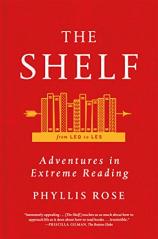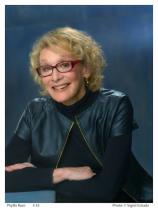Reading Group Guide
Discussion Questions
The Shelf: From LEQ to LES: Adventures in Extreme Reading

1. Discuss Phyllis Rose’s description of the New York Society Library. How does the architecture of your surroundings affect your reading? Describe a memorable library that has had significance in your life.
2. As the author rereads Mikhail Lermontov’s A HERO OF OUR TIME, she discovers something new with almost every reading. Which books have you reread and gained a perspective different than you had the first time around?
3. What does Rose’s experience with A HERO OF OUR TIME show us about the influence translators can have in shaping our experience of a work of fiction?
4. When Rose tracks down Gabrielle Bordwin, the designer of the edgy jacket for one of the editions of A HERO OF OUR TIME, what did you discover about the process of creating a book jacket? What makes a jacket influential, and how can it enhance the timelessness of older works? Describe your favorite cover art.
5. Discussing Gaston Leroux’s THE PHANTOM OF THE OPERA, Rose writes, “A bad book can tell a great story, however inefficiently. Posterity can do an auteur’s work of polishing a narrative.” Do you applaud the process of literary evolution, or do you resist the adaptation of books for stage and screen?
6. When you’re reading a novel, how much do you want to know about the author? As Rose digs for biographical details about various authors, did you cheer her on, or are you a purist who believes that fiction should speak for itself?
7. How did Rose’s encounters with CALL ME ISHTAR compare to her encounters with the book’s author, Rhoda Lerman? How did their shared history predict their shared enthusiasm for the fantastical?
8. How did you react to Rose’s observations about the limited authority and prominence given to female authors and their female protagonists, even in the 21st century? What would it take for this to change significantly?
9. What do you make of the publishing history of Lisa Lerner’s JUST LIKE BEAUTY? How heavily are you influenced by reviews, whether they’re written by New York Times critics or Amazon’s “common readers”?
10. Though Rose found it an uphill climb at first, the 18th-century GIL BLAS eventually hooked her with its numerous cliff-hangers and entwined story lines, much like those of a contemporary television series. (In fact, Lisa Lerner salvaged her finances by writing for the screen.) Have television dramas interfered with our patience for written works?
11. As you read Rose’s observations about detective fiction, what struck you about the authors’ approaches to macabre topics? Do you agree with Rose’s assertion that the detective novel is the least literary genre and that, over time, these novels age badly?
12. The experiment forced Rose to look beyond books she would typically reach for. Were you inspired to attempt a similar experiment? What would your most daring or daunting shelf look like?
13. How does THE SHELF illuminate the literary lives explored in previous books by Phyllis Rose?
14. What qualities do you hold to be necessary in a great work of fiction?
15. Is nonfiction truer than fiction? Or is fiction truer than nonfiction? In which ways is each of these assertions true?
16. At the end of the book, Rose discusses her “inner shelf,” those favorite books we carry around with us to measure our literary encounters. Which books are on your inner shelf? How do these books affect your encounter with a new novel?
The Shelf: From LEQ to LES: Adventures in Extreme Reading
- Publication Date: May 19, 2015
- Genres: Essays, Literary Criticism, Nonfiction
- Paperback: 384 pages
- Publisher: Farrar, Straus and Giroux
- ISBN-10: 0374535361
- ISBN-13: 9780374535360








